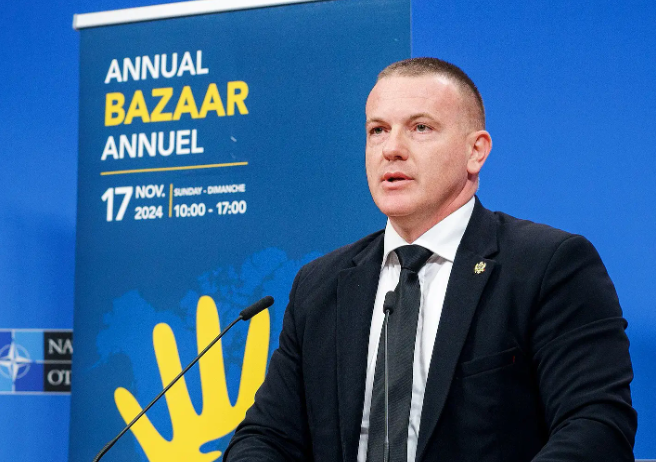Given that the now-deceased Igor Nedović was shot three times on May 17 in a bar in the City Kvart area, a pressing question arises: Why wasn’t he placed under police protection after such a brazen attack, especially considering he was widely regarded as a high-risk target?
That’s exactly what Ivan Pekić, head of the International Police Organization in Montenegro, said in a statement to Antena M, commenting on Nedović’s subsequent murder in Stara Varoš. Arijan Rečković, 23, is suspected of carrying out the killing and had already been identified by police as the perpetrator behind a previous attempt on Nedović’s life just months earlier.
“Following an attempted murder, both international standards and internal regulations of the Montenegrin Ministry of Interior require a formal security risk assessment of the target. The system failed. The mechanism for protecting potential witnesses was never activated. That’s a serious oversight, especially when someone survives an attack like the one Nedović did. At that point, the security services are obligated to assess the threat to that individual’s life, including any criminal affiliations, possible motives for retaliation, and the risk of escalating conflict between rival clans”, said Pekić.
He noted that media outlets had reported Nedović had “switched sides”.
“That’s a major development in organized crime circles, especially amid the ongoing conflict between the Kavač and Škaljari clans. Such a shift in loyalty often triggers swift and lethal retribution. In my opinion, both the police and the National Security Agency (ANB) were well aware of the evolving dynamics and movements within these clans. Switching sides, in itself, is a clear indicator of elevated risk. Yet there was no protective action taken, no surveillance, no restrictions on movement. So yes, he ultimately lost his life due to failures within the security apparatus. Ignoring obvious warning signs of heightened risk reflects a serious institutional weakness in how we analyze and respond to criminal developments“, Pekić emphasized.
He also criticized the lack of coordination among key institutions responsible for combating organized crime, specifically the police, the prosecutor’s office, and the ANB.
“The police investigated the initial attack and detained some individuals involved, but not the actual shooter. The prosecutor’s office was notified and filed charges, while the ANB was responsible for conducting a strategic threat assessment. Yet there’s no evidence that these agencies ever met, coordinated, or shared intelligence to evaluate the risk to Nedović. We’ve heard nothing concrete about that process in the media. This case underscores how ineffective our early warning system is when it comes to individuals like him. The failure to protect people connected to criminal networks is a well-documented issue, both in academic research and in policing practice. Nedović had a criminal past, but at the time of his death, he was neither a fugitive nor under investigation. In many other countries, individuals from the criminal underworld receive protection if there's a credible threat against their lives, precisely to maintain broader public safety. That didn’t happen here“, Pekić said.
Asked about the police’s failure to locate and arrest Rečković for two months, despite him ultimately returning to finish the job, Pekić described it as a breakdown within the Police Directorate’s operational units.
“There should have been a focused investigation and manhunt, especially one centered around Nedović. When you know someone has switched sides in a clan conflict, that’s a glaring sign that a second attempt is likely. I can’t say who exactly dropped the ball within the chain of command, but someone must be held accountable for these operational failures. It’s time we start demanding responsibility from leadership, whether that means resignations or a clear admission of mistakes. The security services made serious errors, and those errors need to be addressed“, he stated.
Attack on Mayor Jovanović Reveals Politicized Police Forces
Pekić also spoke out about the recent attack on Budva’s mayor, Nikola Jovanović, and what it reveals about the broader state of security in Montenegro.
According to Pekić, Jovanović had been filing criminal complaints for nearly a year with various state institutions, warning that his life was in danger from an organized crime group in Budva, backing up those claims with substantial evidence.
“The security system in the country’s main tourist center is in collapse. It’s proven incapable of responding to major threats. Until recently, I believed the Police Directorate had the personnel to meet this challenge. But the way this incident was handled proved otherwise; we are dealing with a politicized police force. The Minister of Interior and the national security coordinator didn’t even publicly condemn the attack. In my view, that’s inexcusable. We should all stand behind efforts to arrest individuals who pose a threat to public safety“, said Pekić.
He added that Montenegro is facing a form of criminality that is politically driven.
“One of the attackers is a high-ranking official of the New Serb Democracy (NSD) party, someone directly involved in the brutal assault on Mayor Jovanović. That makes it crystal clear: we’re dealing with organized political crime embedded within the ruling coalition. These figures are not immune to ties with organized criminal groups. The police show no willingness to confront political actors who wield real power, especially those aligned with Andrija Mandić’s party. Remember the scandal involving his nephew, Danilo Mandić? That alone illustrates how some political players lack the courage, or the will, to confront the leaders currently holding the parliamentary majority“, Pekić concluded.









Komentari (0)
POŠALJI KOMENTAR